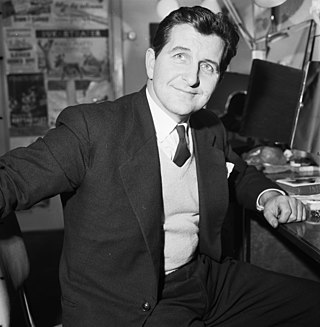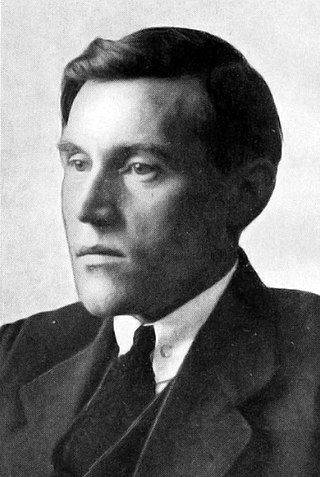Related Research Articles

Torolf Prytz was a Norwegian architect, goldsmith and politician for the Liberal Party. He led the goldsmith company J. Tostrup of Oslo from 1890 to 1938, having inherited it from his grandfather-in-law Jacob Tostrup. He also served as Norwegian Minister of Industrial Provisioning from 1917 to 1918 and President of the Norwegian Red Cross from 1922 to 1930.

Johan Wallace Hagelsteen Bøgh was a Norwegian museum director and art historian based in the city of Bergen.

Sevald Theodor Richard Andvord was a Norwegian businessperson, known for founding the company Rich. Andvord.
Ingvald Mareno Smith-Kielland was a Norwegian royal servant.
Oslo Kino is a Norwegian cinema company, based in Oslo.
Kommunenes Filmcentral was a film distributor in Norway.

Jack Fjeldstad was a Norwegian actor and stage producer. He was active on stage and in films for more than fifty years.
Conrad Vogt-Svendsen was a Norwegian priest. He was assistant seamen's priest in Hamburg during Second World War, helped with the White Buses operation in 1945, and was later main priest for the deaf in Norway.

Leif Sinding was a Norwegian film director and journalist.
Bortreist på ubestemt tid is a crime novel published in 1972 by the Norwegian writer Sigrun Krokvik. For this novel Krokvik was awarded the very first Riverton Prize in 1972, a prize which has since been awarded annually for the best literary crime product in Norwegian language. The novel was adapted into the film Bortreist på ubestemt tid from 1974, directed by Pål Bang-Hansen.
Oddvar Bull Tuhus is a Norwegian film director, script writer and television worker. His film debut was Rødblått paradis from 1971. His Maria Marusjka from 1973 was awarded the Norwegian Film Critics' Prize. His film Streik! from 1974, based on a novel by Tor Obrestad, was presented at the Cannes Film Festival. Tuhus was manager for the Norwegian Broadcasting Corporation's department NRK Drama from 1994 to 2000. In his movie Hockey Fever, goaltender Jørn Goldstein has a central role.
Knut Bohwim was a leading Norwegian film director. He co-founded the company Teamfilm A/S in 1962. His debut as film director was Operasjon Sjøsprøyt from 1964. He directed the war drama Det største spillet from 1967, about the double agent Gunvald Tomstad. He directed twelve films of the Olsenbanden series, the largest commercial success in Norwegian film history. Bohwim was awarded the Amanda Honorary Award in 1997, shared with Aud Schønemann.

Elsa Lystad was a Norwegian film and stage actress. She was a recipient of the Leonard Statuette, the King's Medal of Merit, the Amanda Honorary Award, and Gullruten.

Kristoffer Aamot was a Norwegian journalist, magazine editor, politician and cinema administrator.
Knut Andersen was a Norwegian film director. He was born in Harstad. He directed a series of films, including Sus og dus på by'n (1968), Ballad of the Masterthief Ole Hoiland (1970), Marikens bryllup (1972), Under a Stone Sky (1974), Karjolsteinen (1977), and Den sommeren jeg fylte 15 (1975). He received the Amanda Committee's Honorary Award in 2007.
Erik Borge was a Norwegian film director and screenwriter. He was born in Kristiania. Among his productions was Trost i taklampa from 1955, based on Alf Prøysen's novel. He was manager of the company Norsk Film from 1966 to 1984. He received the Amanda Committee's Honorary Award in 1989, shared with Erik Diesen.
Øyvind Vennerød was a Norwegian film director and producer. He was born in Kristiania, and was the father of Petter Vennerød.
The following is a list of notable events and releases of the year 1916 in Norwegian music.
The following is a list of notable events and releases of the year 1890 in Norwegian music.
References
- 1 2 3 4 5 Svendsen, Trond Olav (2007). "Film & Kino". In Henriksen, Petter (ed.). Store norske leksikon (in Norwegian). Oslo: Kunnskapsforlaget. Retrieved 3 August 2009.
- 1 2 Solum, Ove; Asbjørnsen, Dag, eds. (2008). "Den norske kinomodellen". Film og kino. Den norske modellen (in Norwegian). Oslo: Unipub. p. 16. ISBN 978-82-7477-355-4.
- ↑ Solum and Asbjørnsen, 2008: p. 21
- ↑ Solum and Asbjørnsen, 2008: p. 17
- ↑ Solum and Asbjørnsen, 2008: p. 20
- ↑ Svendsen, Trond Olav (2007). "Norsk filminstitutt". In Henriksen, Petter (ed.). Store norske leksikon (in Norwegian). Oslo: Kunnskapsforlaget. Retrieved 3 August 2009.
- ↑ "Who are we?". Film & Kino. Retrieved 3 August 2009.
- ↑ "FILM&KINOs styre" (in Norwegian). Film & Kino. Retrieved 3 August 2009.